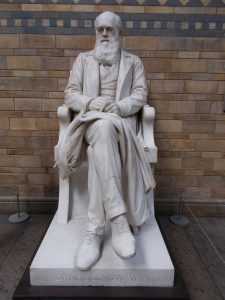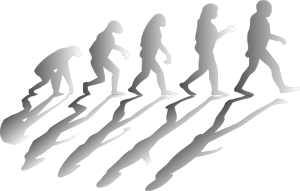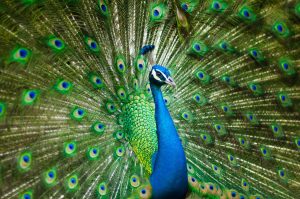

2009 marked the bicentenary of the birth of Charles Darwin, and his name was everywhere in the media. Newspapers carried features, and the national treasure David Attenborough presented a BBC television programme in his honour. The public’s imagination was captured; at the Natural History Museum a special exhibition Darwin’s Big Idea on any given day could be sold out.
Yet in the media there are sometimes references to polls which reveal the percentage of people who do not believe in evolution. The number is usually perceived to be surprisingly high, given that science has now “firmly established evolution as fact”.
Why are the public so unconvinced? The scientists’ answer may perhaps be expressed in more polite language than this, but the gist of it is that these people are too stupid to understand, and prefer to cling to false hopes that there may be a God, that life may have meaning, and on the whole don’t take the trouble to study the science, and listen to scientists and their compelling arguments.
An outstanding example of these points is provided by the well-known atheist philosopher Daniel Dennett in this passage from his anti-religion book Breaking the Spell (1). He talks about “…those who don’t yet appreciate just how well established the theory of evolution by natural selection is. According to a recent survey, only about a quarter of the population of the United States understands that evolution is almost as well established as the fact that water is H20 ”. He calls this an “embarrassing statistic”, and continues: “Could so many people be wrong? Well, there was a time not so long ago when only a small minority of Earth’s inhabitants believed that it was round and that it traveled round the sun… But how, in the face of so much striking confirmation and massive scientific evidence, could so many Americans disbelieve in evolution?” He calls this “the widespread misinforming of the population”, and blames priests, whom the people trust more than scientists. He continues: “There are no reputable scientists who claim this. Not a one. There are plenty of frauds and charlatans, though. …. What about the Scientific Creationists and Intelligent Design proponents who are so vocal and visible in well-publicized campaigns? They have all been carefully and patiently rebutted by conscientious scientists who have taken the trouble to penetrate their smoke screens of propaganda and expose both their shoddy arguments and their apparently deliberate misrepresentations and evasions”. He then invites his readers to educate themselves in evolutionary theory and its critics, which he says “should only take a few months of hard work”, and suggests various texts and websites to study.
Let’s examine his points in more detail.
It’s strange that a trained philosopher should include in his arguments an appeal-to-authority which, according to the rules of Logic, is considered to be a flaw or fallacy. Of course it is said, quite reasonably, that this fallacy should not be applied to dismiss the claims of experts, or scientific consensus, which is what Dennett is doing here, or at least thinks he is. Surely, however, it is not inconceivable that a scientific consensus just might be wrong. (Click on link for explanation of these points if required – it’s the second page.) As I’ll show below, there are significant experts who disagree.
“According to a recent survey, only about a quarter of the population of the US understands that evolution is almost as well established as the fact that water is H20”.
This is of course nonsense. How many scientific papers or books have been published recently arguing the case that the chemical composition of water is not H20? None. And who can even begin to imagine where they would start their argument?
“There are no reputable scientists who claim this. Not a one”.
Dennett is such a fanatic that it is possible that his definition of “reputable” is someone who accepts Darwinian evolution, in which case the statement is mere tautology. I’ll put that idea to one side, however, and mention some of the scientists highly critical of Darwinism, whom Dennett, writing in 2006, had failed to notice. I’ll mention some of their qualifications, so that you can decide whether they are reputable or not.
I’ll begin with biologists and related disciplines, in approximate chronological order:
D’Arcy Wentworth Thompson’s On Growth and Form . As this year marks the centenary of its publication, this classic book is a good place to start. Stephen Jay Gould, preeminent palaeontologist, describes the author as “perhaps the greatest polymath of our century”, and the book as “the greatest work of prose in twentieth-century science”. Peter Medawar, eminent biologist, says of it “beyond comparison, the finest work of literature in all the annals of science that have been recorded in the English tongue” (2). In it Thompson argued that the shapes, forms and growth processes we observe in nature are not an arbitrary result of evolution’s blind searching, but are governed by mathematical rules. Douglas Dewar, ornithologist (and admittedly a Creationist, although one producing books and papers of high scientific quality). See especially Difficulties of the Evolution Theory (3), and The Transformist Illusion (4).
J. C. Willis, distinguished botanist, Fellow of the Royal Society, honorary doctorate of Science from Harvard. His most significant book is The Course of Evolution (5). He believed that plants are impossible to understand through Darwinian processes.
Dr. W. R. Thompson, biologist, renowned entomologist, Fellow of the Royal Society. See his introduction to a new edition of The Origin of Species in 1956, where he said: “The modern Darwinian palaeontologists are obliged, just like their predecessors and like Darwin, to water down the facts”. He talks about “fragile towers of hypotheses based on hypotheses, where fact and fiction mingle in an inextricable confusion” (6).
E. J. H. Corner, Cambridge Professor, Fellow of the Royal Society. See his paper on Evolution in Contemporary Botanical Thought (7). In it he states that “to the unprejudiced, the fossil record of plants is in favour of special creation”. Please note that this does not make him a Creationist, whose beliefs are inspired by the Bible, rather that the available scientific evidence suggests that. Like many who follow in this list, he believes in evolution, but not neo-Darwinian evolution, which he calls a temple where believers worship. He says of Darwinian literature: “textbooks hoodwink” (p97).
Professor Andrée Tétry, eminent French biologist. See A General History of the Sciences, volume 4, 1966, section on Evolution (8).
The interesting case of Gavin de Beer, who was a significant, and usually loyal, Darwinian biologist and embryologist. However, in 1971 he published Homology, the Unsolved Problem, which brought up significant material which challenged neo-Darwinian genetic assumptions about common ancestry (9).
Pierre-Paul Grassé, one of Europe’s greatest zoologists, who had many academic appointments, and was president of the Académie des Sciences (is that reputable enough?), said that Darwinism is demonstrably false, since it clashes with so many experimental findings. His most important book, and savage attack on Darwinism, is Evolution of Living Organisms (10), where he calls it a “pseudoscience”, “depending on frequent miracles”, and that “Darwinists only look at those facts that fit their theory”.
Dr. Pierre Gavaudan, botanist and cytologist. He worked on carnivorous plants, and concluded that they could not be explained by Darwinian theory. He called neo-Darwinism an “ingenious romance” (11).
Richard Lewontin, Harvard Professor of Biology, wrote: “The theory becomes a vacuous exercise in formal logic that has no points of contact with the contingent world. The theory explains nothing because it explains everything” (12). He also said that many organisms “appear to have been carefully and artfully designed”, which is both a challenge to Darwinism and “the chief evidence of a Supreme Designer” (13).
Rupert Sheldrake, distinguished biologist, former Director of Studies in biochemistry and cell biology at Clare College Cambridge, and his theories of formative causation and morphogenetic fields. See A New Science of Life (14), and The Presence of the Past (15) .
Brian Goodwin, professor of Biology, wrote a significant book critical of Darwinism, How the Leopard Changed Its Spots (16), which was awarded the Scientific and Medical Network Book Prize for 1995. (This was obviously not enough to make him reputable in Dennett’s eyes!) He suggested that organisms are dynamic self-organizing processes that obey certain principles of order, thus questioning the importance of natural selection and adaptation as the fundamental concepts of evolution.
In the same year that Dennett wrote, the physiologist and systems biologist Denis Noble published The Music of Life, Biology Beyond Genes (17). His theory of downward causation would horrify a neo-Darwinist.
I could go on, but hopefully I have made the point. However, here are two of the more dramatic denunciations which Dennett, writing in 2006, had failed to notice.
In 1981 Colin Patterson, senior paleontologist at the British Museum of Natural History, read a paper at the American Museum of Natural History in New York (18). He said: “…last year I had a sudden realization. For over twenty years I had thought that I was working on evolution in some way. One morning I woke up, and something had happened in the night, and it struck me that I had been working on this stuff for twenty years, and there was not one thing I knew about it. That was quite a shock, to learn that one can be so misled for so long.” Because of this experience, he decided to ask his colleagues the same question ‘can you tell me anything you know about evolution, any one thing, any one thing that you think is true?’ “I tried that question on the geology staff at the Field Museum of Natural History, and the only answer I got was silence. I tried it on the members of the Evolutionary Morphology Seminar in the University of Chicago, a very prestigious body of evolutionists, and all I got there was silence for a long time”. He declared at the same meeting that evolution was “positively anti-knowledge”, saying that “all my life I had been duped into taking evolution as revealed truth”.
Along similar lines Lynn Margulis, Distinguished Professor of Botany and Geosciences, said that history will ultimately judge neo-Darwinism as “a minor twentieth-century religious sect within the sprawling religious persuasion of Anglo-Saxon biology” (19). According to Michael Behe, at one of her public talks Margulis “asks the molecular biologists in the audience to name a single, unambiguous example of the formation of a new species by the accumulation of mutations. Her challenge goes unmet. Proponents of the standard theory, she says, ‘wallow in their zoological, capitalistic, competitive, cost-benefit interpretation of Darwin… Neo-Darwinism, which insists on (the slow accrual of mutations), is in a complete funk’ ” (20).
I’ll move on now to geneticists critical of Darwinism. Perhaps the most famous amongst them historically was Richard Goldschmidt, a first-class geneticist with impeccable credentials, praised even by his intellectual opponents. He concluded, since many species and genera appear suddenly in the fossil record, differing sharply from earlier groups, that evolution did not proceed by small steps, contrary to Darwin’s thinking, and came up with the notorious concept of “hopeful monsters” (21).
John McDonald, University of Georgia, wrote: “The results of the last 20 years of research on the genetic basis of adaptation has led us to a great Darwinian paradox. Those (genes) that are obviously variable within natural populations do not seem to lie at the basis of many major adaptive changes, while those (genes) that seemingly do constitute the foundation of many, if not most, major adaptive changes apparently are not variable within natural populations” (his italics) (22). (Gene mutation is of course the foundation of neo-Darwinian theory.)
(See footnote 23 for further examples.)
Physicists are often very critical of Darwinian theories:
Paul Davies is a well-known figure, writing books for the general public. See The Cosmic Blueprint (24), and a lecture The Cosmic Blueprint: Self-Organizing Principles of Matter and Energy (25). (The use of the word blueprint is suggestive of the term archetype, which was the theory generally believed before Darwin came along.)
You may not have heard of the late Glen Schaefer, but he was an impressive figure who held degrees in Mathematical Physics and Quantum Field Theory, with a second career in biology and ecology. He said: “All the sources of information that I’m using are from people who have worked at least twenty-five years and are at the head of their fields, and are in print. If you look into those positions, you will find that there is no evidence for evolution (I assume he means neo-Darwinian) and they say so. We believe it because of our education” (26).
Professor Henry S. Lipson, distinguished member of the Institute of Physics, in communications to Physics Bulletin 1979 and 1980 (27), made the following significant statements:
“I have.. tried to see whether biological discoveries over the last thirty years or so fit in with Darwin’s theory. I do not think that they do. To my mind, the theory does not stand up at all.”
“In fact, evolution became in a sense a scientific religion; almost all scientists have accepted it and many are prepared to ‘bend’ their observations to fit in with it.”
“the only acceptable explanation (for living matter) is creation”.
See also Lee Spetner, Not by Chance! Shattering the Modern Theory of Evolution (28).
I should note at this point that evolutionary biologists often have a very poor understanding of the quantum physics revolution, if they are even aware at all of its findings. An exception would be Bruce Lipton, who began as a Darwinian biologist, but said that an understanding of quantum physics liberated him from the antiquated worldview on which Darwinism is based. He wrote that “quantum physics is relevant to biology and that biologists are committing a glaring, scientific error by ignoring its laws”. “We biologists almost universally rely on the outmoded, albeit tidier, Newtonian version of how the world works” (29). (Thus in his view biologists on the whole operate from a starting point of ignorance).
It is clear therefore, contrary to what Dennett says, that there have always been and remain a significant number of reputable scientists who are critical of, even scathing about, Darwinian theory.
Let me remind you of another statement by Dennett above. He claims that the opposition to the “truth” of Darwinian theory is religiously motivated – priests, Scientific Creationists and Intelligent Design proponents. This is again wrong, since many of the scientists mentioned above are atheists, agnostics or otherwise indifferent to religion, and believe in evolution (but not neo-Darwinian).
I’ll pick out two striking examples. Professor Lipson, mentioned above, having said that “the only acceptable explanation (for living matter) is creation”, went on to say that the idea was “anathema” to him, “but we must not reject a theory that we do not like if the experimental evidence supports it” (my italics). Distancing himself from biblical Creationism, he said elsewhere “in our present state of knowledge creation is the only answer – but not the crude creation envisaged in Genesis” (30).
Richard Lewontin, who in the quotes above spoke of design, later wrote, in an extraordinarily revealing and refreshingly honest description of the stance of modern science:
“…we are forced by our a priori adherence to material causes to create an apparatus of investigation and a set of concepts that produce material explanations, no matter how counter-intuitive, no matter how mystifying to the uninitiated. Moreover, that materialism is absolute, for we cannot allow a Divine Foot in the door” (31).
The important point is not whether all these dissenting scientists are right or wrong (although I believe on the whole that they are right), rather that Dennett is either choosing to live in a state of ignorance – an ostrich with his head buried deeply in the sand – or is deliberately lying to the public. Whichever is the case, if atheistic neo-Darwinians need to do this in their attempts to convert the public to their point of view, why should we listen to anything they say?
As for “smoke screens of propaganda”, “shoddy arguments” and “deliberate misrepresentations and evasions” (Dennett’s words in the quote above), in relation to neo-Darwinian advocates and theorists, the Dennett quote being a prime example, the words pot, kettle and black spring to mind. I wonder if he would be prepared to spend “a few months of hard work” studying all the scientists mentioned above.


Footnotes:
1. Viking, 2006. My quote is taken from the Penguin edition, 2007, p60-61. 2. Gould’s foreward to the Cambridge University Press Canto edition, 1992
3. Edward Arnold, 1931
4. Dehoff Publications, 1957. Described by Alan Hayward as ‘one of the most scholarly and effective exposures of the weaknesses of Darwinism ever written’ (Creation and Evolution: the Facts and the Fallacies, Triangle, 1985, p208).
5. Cambridge University Press, 1940
6. Everyman Library No. 811, Dent
7. Oliver & Boyd, Edinburgh & London, 1961
8. Thames & Hudson. English translation of La Science Contemporaine II, ed. René Taton.
9. Oxford University Press, 1971
10. Academic Press Inc., 1977, see pp. 6, 103, 50
11. See his contribution to Mathematical Challenges to the neo-Darwinian Interpretation of Evolution, P. S. Moorhead and M. M. Kaplan, Wistar Institute Press, 1967.
12. The Genetic Basis of Evolutionary Change, p11-12, quoted by Tom Bethell, Darwin’s House of Cards, p124.
13. “Adaptation”, Scientific American, September 1978, pp. 119-130, quoted by Francis Hitching, The Neck of the Giraffe or Where Darwin Went Wrong, Pan, 1982, p84, (accurately I hope, as this one is somewhat surprising, given other things he has said).
14. Blond and Briggs 1981, Anthony Blond 1985
15. HarperCollins, 1988
16. Weidenfeld and Nicolson 1994
17. OUP, 2006
18. Evolution and Creation, November 5th 1981
19. C. Mann, (1991), “Lynn Margulis: Science’s Unruly Earth Mother”, Science, 252, 378-381.
20. Darwin’s Black Box, The Free Press, 1996, p26. I assume he is referring to further material from the reference in footnote 19.
21. He wrote The Material Basis of Evolution, Yale University Press, 1940.
See also “Evolution, as viewed by one geneticist”, 1952, American Scientist 40: 84-98. Norman Macbeth summarises his argument: ‘evolution has obviously proceeded from the higher categories to the lower… whereas the Darwinians teach just the opposite’ (Darwin Retried, Garnstone Press, 1974, p139n).
22. “The Molecular Basis of Adaptation”, Annual Review of Ecology and Systematics 14, 1984, p93, quoted by Michael Behe, Darwin’s Black Box, The Free Press, 1996, p28.
23. Behe also mentions evolutionary geneticist George Miklos, and University of California geneticist John Endler.
24. William Heinemann Ltd., 1987
25. Transcribed in The Spirit of Science, David Lorimer (ed.), Floris Books, 1998
26. Ibid., p122, in a lecture entitled A Holistic Philosophy of Nature. It would be interesting to know exactly who he was talking about. Unfortunately, because this is a quote from a lecture transcript, rather than a book, his sources are not provided.
27. Especially vol. 31, No. 4, May 1980, pp 138, 337
28. Judaica Press, 1998
29. The Biology of Belief, Hay House 2005 revised 2008, p69
30. New Scientist, Vol 90 No 1253, May 14th 1981, p452
31. In a January 9th 1997 review of Carl Sagan’s The Demon-Haunted World, still available at time of writing at http://www.nybooks.com/articles/1997/01/09/billions-and-billions-of-demons
[…] The philosopher Daniel Dennett is another culprit. For a lengthy critique see my post, but here is a brief taster. In his anti-religion book Breaking the Spell he talks about […]